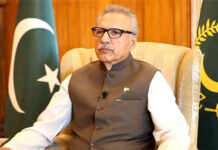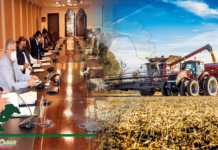Monsanto Company recently released its 2017 Sustainability Report, titled ‘Growing Better Together’. The report demonstrates Monsanto’s commitment to sustainability and details the company’s progress against all its goals, including improving irrigation water efficiency, which has the potential to save up to 80 billion gallons of water each year.
Monsanto has set a target of improving irrigation water efficiency of global seed production by 25 percent by 2020 and is more than halfway to that goal. This represents just one of the many advancements the company made on its environmental and social commitments for the year 2017.
On the occasion of the report’s publication, Mr Aamir Mahmood Mirza, Monsanto Pakistan’s country lead, explained in detail the ethos that drives this commitment towards sustainable agriculture and talked us through some of the most exciting technological developments that underpin the progress thus far.
Profit: Tell us a little bit about Monsanto as a company?
Aamir Mahmood Mirza: As an agriculture technology company, Monsanto is committed to bringing a broad range of solutions to help nourish our growing world. We produce seeds for fruits, vegetables, and key crops – such as corn, soybeans, and cotton – that help farmers have better harvests while using water and other important resources more efficiently. We work to find sustainable solutions for soil health, help farmers use data to improve farming practices and conserve natural resources and provide crop protection products to minimise damage from pests and disease. Through programs and partnerships, we collaborate with farmers, researchers, non-profit organisations, universities, and others to help tackle some of the world’s biggest challenges.
Profit: What do you see as the greatest challenge to the future of agriculture?
AM: Food security is going to be the foremost challenge faced across the world in the coming years. According to the UN estimates, the global population will increase by over 50 percent by the year 2050. That is an additional 3 billion mouths to feed. Back in 1960, there was 1 acre of farmland available per person. By 2050, the ratio will be down to one-third. Changes in climatic conditions further challenge our capacity. Furthermore, demand for water continues to grow at an average 2% per annum, threatening existing agriculture practices. These times call for a smarter, more technologically advanced approach to agriculture, allowing us to produce food for a growing population in a sustainable way.

Profit: Which technological advancement has the greatest promise?
AM: Monsanto is a world leader in agriculture technology. Though we are mostly associated with advances in GM or biotech crops, we actually boast of a very diversified portfolio of technology platforms, including plant breeding, biotechnology, precision agriculture, biologicals, and crop protection.
Our precision agriculture platform is perhaps the most exciting of them all. It combines mobile technologies and sensors with advanced data analytic capabilities to deliver tremendous value to the farmer. Imagine a farmer receiving a crop ‘prescription’ customised with precise instructions directing unmanned and GPS-enabled farm machinery to optimally plant the seed, apply fertiliser, and irrigate the crop. All of this while drawing from its predictive climatic models, anticipating rain, heat, and storms.
Profit: How successful have you been in introducing these exciting new technologies and innovation in Pakistan?
AM: Presently, Monsanto markets its high-performance hybrid corn seed, vegetable seed, and a non-selective herbicide in Pakistan. Our hybrid seeds are brought to the farmer through an extensive breeding programme and rigorous in-country adaptability trialling. At Monsanto, we have taken conventional plant breeding to the next level, combining our global repository of germplasm with precision breeding apparatus to reduce seed development timelines. In the future, we will be looking to integrate other technology platforms into our business.
The introduction of high-yield hybrid corn some 15 years ago has brought about a phenomenal change in Punjab’s agriculture landscape. Average per acre yields have almost tripled, subsequently leading to over 95% of the corn crop area in the province now planting the hybrid seed. The added productivity continues to add to the rural economy and favourably impacts farmer livelihood. The crop value chain has now emerged as far more dynamic, adding value to downstream industries, such as poultry and livestock. In fact, more than 65% maize grain produced is now consumed by the poultry industry as the primary ingredient in feed. This sustained supply of locally produced grain has been a key driver in fuelling the double-digit growth of the poultry industry over the past few years.
Profit: Why is sustainability central to the future of agriculture?
AM: Modern agriculture helps make farming more sustainable by giving farmers digital tools and other advancements to grow crops using fewer natural resources. At Monsanto, our sustainability strategy is all about ‘Growing Better Together’ on a foundation of principled business and human rights across three main focus areas: Better Planet, Better Lives, and Better Partner. Each focus area includes specific goals against which we measure our progress and report the progress in our annual sustainability report.
Our sustainability approach is informed by our own global materiality assessment and globally agreed upon agendas and accords like the 2030 Development Agenda of the United Nations and its 17 Sustainable Development Goals (SDGs), and the UN Global Compact, amongst others. Though Monsanto’s work contributes to each of the 17 SDGs, through an extensive mapping process, we have identified six SDGs that are particularly relevant to Monsanto’s business and three that are significant to how we work.
Just to highlight some of these achievements: we pledged to reduce greenhouse gas emissions intensity from our crop protection operations by 22% by 2020. We have now achieved 92% of our goal. We have improved our overall irrigation water application efficiency to77%, and this year again we continued to help farmers use 1/3 fewer resources per unit of corn (72% achieved), soybeans (54% achieved) and Cotton (101% achieved) by 2030. Our goal of helping farmers double yields of our target crops by the year 2030 also progresses well, with over 30% of the goal achieved till date.
Monsanto has helped improve the lives of 4.5 million resource-poor farmers out of our goal of 5 million by 2020. In addition, we trained 2.5 million small-hold farmers on sustainable farming practices in 2017 and awarded US$6 million in grants from the Monsanto Fund to rural communities for the year.






